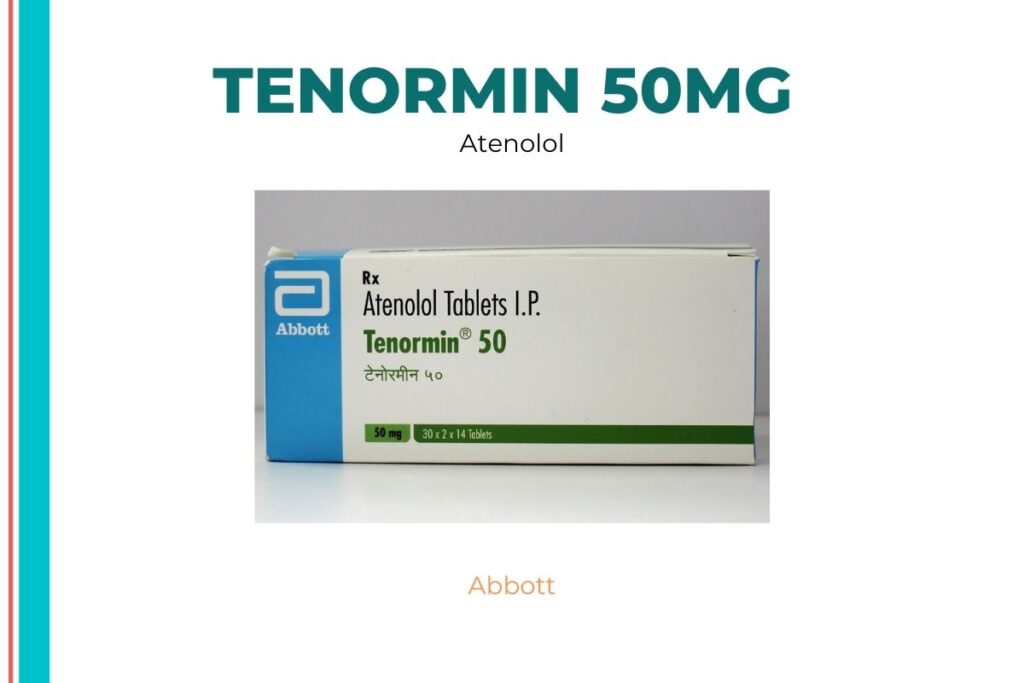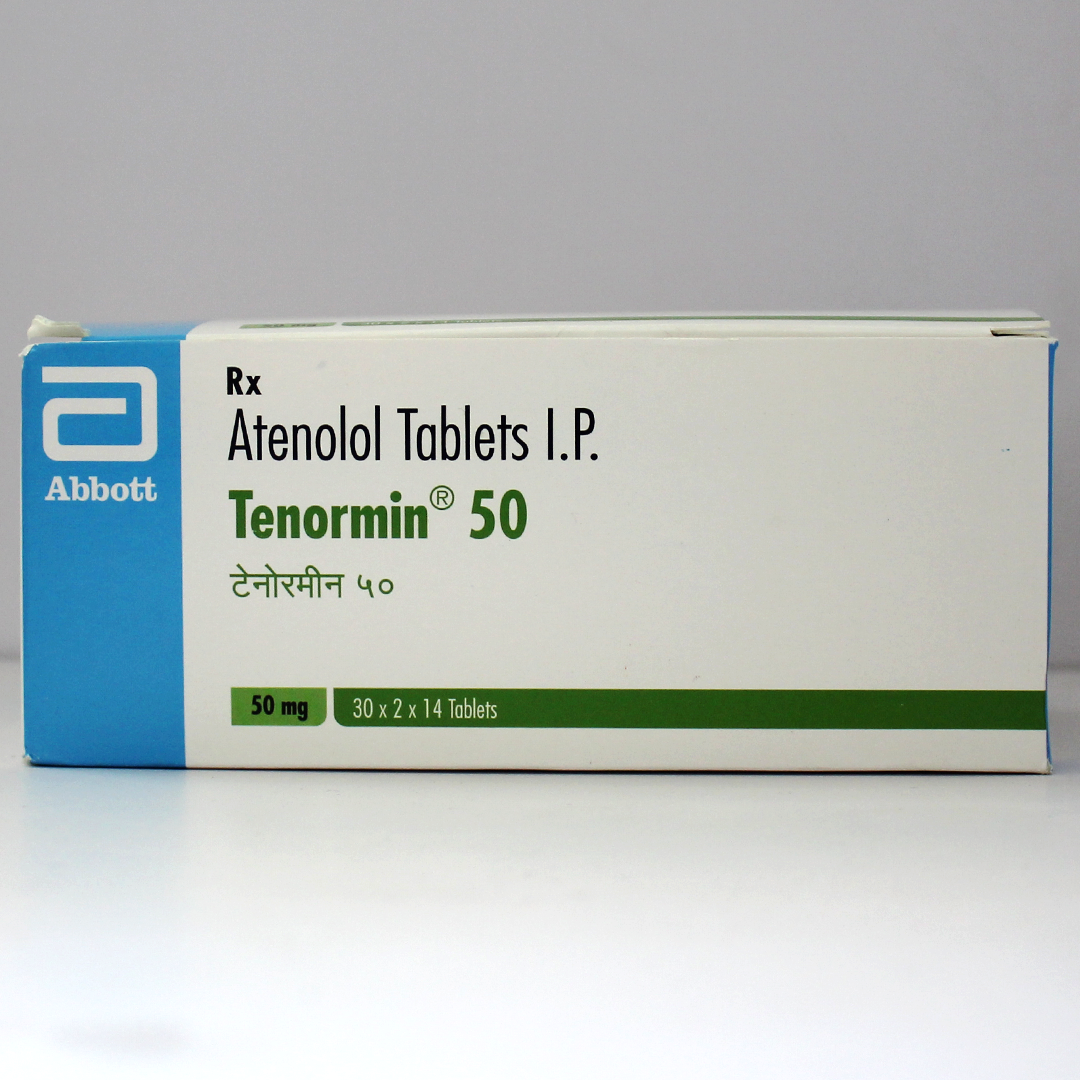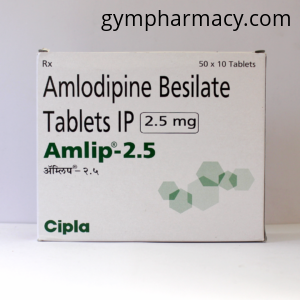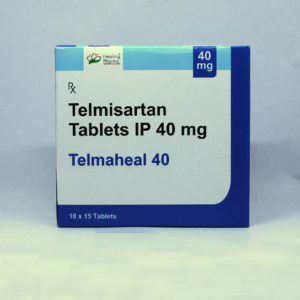Tenormin 50
Tenormin 50 is a beta-blocker, which is a class of drugs used to treat heart problems. It aids in the treatment of high blood pressure (hypertension), irregular heartbeats (arrhythmias), chest discomfort with a painful tightness in the chest (angina pectoris), and protects the heart during the early stages of heart attack treatment (myocardial infarction). High blood pressure puts a strain on the heart, and if it persists for a long period, the heart and blood vessels (arteries) may become damaged. It can cause a stroke, heart failure, or kidney failure by damaging the arteries of the brain, heart, and kidneys. Lowering blood pressure, on the other hand, may lessen the risk of stroke and heart attacks.
Tenormin 50 contains atenolol, a chemical that works to relax blood arteries by preventing the function of certain natural substances in the body. As a result, Tenormin 50 lowers your high blood pressure and lowers your chance of a stroke, heart attack, other heart problems, or kidney difficulties in the future.
Tenormin 50 can be taken with or without food, or before or after a meal. Based on your medical condition, your doctor will tell you how often you should take your medications. Headaches, cold hands/feet, diarrhea, nausea, fatigue, hurting and fatigued muscles, depressed mood, and dizziness are all possible side effects. The majority of Tenormin 50 negative effects do not require medical treatment and fade away with time. However, if the negative effects do not go away, consult your doctor.
If you stop taking this prescription on your own, your blood pressure may rise, increasing your risk of a heart attack. If you have kidney or liver illness, heart disease, or diabetes, tell your doctor. Please inform your doctor if you are pregnant or breastfeeding so that Tenormin 50 can be prescribed appropriately. It should not be administered to youngsters under the age of twelve. Before undergoing any planned operation, inform your doctor that you are using Tenormin 50 . Due to the increased risk of low blood pressure (hypotension) with anesthesia, your doctor may urge you to discontinue using Tenormin 50 .
If you suffer a cardiogenic shock, avoid using Tenormin 50 . (sudden stopping of blood flow to the heart). If you are allergic to this medicine or are on any other medications, please inform your doctor. If you have asthma, wheezing, or other breathing problems, allergic reactions (such as insect stings), chest pain (Prinz metal’s angina), poor blood circulation, first-stage heart block, diabetes, fast heartbeat, thyrotoxicosis (overactive thyroid gland), or kidney failure, you should not take Tenormin 50 or consult a doctor. Tenormin 50 can disguise some of the symptoms of low blood sugar (hypoglycemia) and an overactive thyroid (hyperthyroidism), therefore it’s important to keep an eye on your blood sugar and thyroid profile.

Tenormin 50 Applications
Blood pressure that is too high (hypertension)
Irregular heartbeat is a condition in which the heartbeat is irregular (arrhythmias)
Chest pain caused by the heart (angina)
Heart attack and stroke prevention
Medicinal Advantages
Tenormin 50 contains atenolol, a chemical that works to relax blood arteries by preventing the function of certain natural substances in the body. As a result, Tenormin 50 lowers your high blood pressure and lowers your chance of a stroke, heart attack, other heart problems, or kidney difficulties in the future. To be effective, this medicine must be used on a regular basis.
Use Instructions
Tenormin 50 can be taken orally, with or without food, or according to your doctor’s instructions. With around a glass of water, swallow the entire tablet. It should not be crushed, chewed, or broken. To get the best benefits, take the medication at the same time every day. Never take an overdose to compensate for a missed dosage.
Storage
Store in a cool, dry location away from direct sunlight.
Tenormin 50 Side Effects
Headache
Hands/feet are cold.
Diarrhea
I’m not feeling well (nausea)
I’m exhausted.
Muscle aches and fatigue
Depressed state of mind
Dizziness
Drug Recommendations
Don’t stop taking Tenormin 50 without first consulting your doctor. Tenormin 50 withdrawal may cause changes in your heart rhythm and blood pressure, as well as chest pain and a heart attack. To help prevent these effects, your doctor will gradually reduce your dose over time. If you have a very sluggish heartbeat, asthma, a significant heart problem (sick sinus syndrome), or a heart obstruction, you should not use Tenormin 50 . It should not be administered to youngsters under the age of twelve. If you have a muscle disorder (myasthenia gravis, rhabdomyolysis), a breathing problem (COPD, bronchitis, emphysema), low blood sugar (hypoglycemia), low blood pressure (hypotension), depression, previous heart failure, liver/kidney disease, thyroid hormone disorder, adrenal gland cancer, or problems with circulation (Raynaud’s syndrome), tell your doctor before taking Tenormin 50 Tablet 14’s.
Interactions Between Drugs
Interactions between drugs: Other blood pressure medications (acebutolol, bisoprolol, carteolol, esmolol, metoprolol, nadolol, nebivolol, sotalol, lisinopril, enalapril, diltiazem, prazosin, terazosin, doxazosin), asthma medications (like theophylline), pain relievers (disopyramide, quinidine, amiodarone, digoxin, adrenaline, epinephrine).
Drug-Food Interactions: Grapefruit and high-protein diets have a negative effect on atenolol. As a result, it should not be combined with Tenormin 50 . Combining Atenolol with multivitamins/minerals may reduce Tenormin 50 effects. If Atenolol is required, allow at least 2 hours between the administration of Atenolol and the administration of multivitamins/minerals.
People with diabetes, asthma, cardiogenic shock (when the heart fails to pump enough blood to the body), heart valve problems (stenosis), low blood pressure (hypotension), coronary heart disease, liver illness, or heart failure should not take atenolol.
Safety Suggestions
ALCOHOL
Avoid drinking alcohol while taking Atenolol because it can make you dizzy or lightheaded.
PREGNANCY
Atenolol should not be taken unless it has been recommended by a doctor. Atenolol is a pregnancy medication classified as Category D. Pregnant women should avoid taking Atenolol during pregnancy because it has been associated to intrauterine growth restriction and has been demonstrated to breach the placental barrier.
BREAST FEEDING
It should be used with caution, and it is best to see a doctor before doing so. Before prescribing them to you, your doctor will consider the benefits as well as any potential hazards. Hypoglycemia (low blood sugar) and bradycardia are risks for newborns (slow heartbeat or rate).
DRIVING
Only drive if you are physically fit and mentally alert. You should not drive or operate any machinery or vehicles if you suffer dizzy after taking this medicine.
LIVER
If you have a history of liver disease or condition, you should use Atenolol with caution. Your doctor may need to modify the dosage. Please seek medical advice.
KIDNEY
Patients with renal failure or severe kidney damage are not advised to take atenolol. Please seek medical advice. Before prescribing them to you, your doctor will consider the benefits as well as any potential hazards.
No habit formation
Advice on Diet and Lifestyle
Maintain a healthy weight by keeping your BMI (Body Mass Index) between 19.5-24.9.
Do at least 150 minutes of regular physical activity or exercise every week, or around 30 minutes most days of the week. This can help you lower your high blood pressure by roughly 5 millimeters of mercury.
A diet high in whole grains, fruits, vegetables, and low-fat dairy products is recommended.
For most adults, limiting sodium chloride (table salt) in their daily diet to 2300 mg or less than 1250 mg is optimum.
The best way to reduce your risk of heart disease is to stop smoking.
Chronic stress can raise your blood pressure, so avoid it. To cope with stress and practice mindfulness techniques, try to appreciate and spend time with your loved ones.
Monitor your blood pressure on a daily basis, and if it fluctuates too much, contact your doctor right away.
Include heart-healthy omega 3 fatty acid-rich foods and beverages in your daily diet. Low-fat cooking oils such as olive oil, soybean oil, canola oil, and coconut oil can also assist to lower your blood pressure.
Recommendations
Before taking Tenormin 50 , patients with hyperthyroidism (overactive thyroid), lung problems (asthma), or diabetes should visit a doctor. Before prescribing Atenolol, your doctor may recommend that you undergo a diagnostic test.
Additional Information : This item is non-refundable.
Glossary of Diseases and Conditions
The force with which our heart pumps blood to all regions of the body is measured by blood pressure. When blood pressure is too high, it is known as hypertension. Hardened arteries (blood vessels) can develop as a result of this illness, reducing blood and oxygen flow to the heart. Angina (chest pain) and heart attack can both be caused by high blood pressure (when blood supply to the heart is blocked). High blood pressure can potentially lead to brain damage (stroke) and kidney failure. A blood pressure monitor or sphygmomanometer can be used to detect high blood pressure. The pressure created when the heart pumps blood out is known as systolic pressure. Diastolic pressure, on the other hand, is the pressure in your heart while it is at rest between heartbeats. The systolic pressure is 140 mm of Hg, and the diastolic pressure is 90 mm of Hg if your blood pressure is 140/90 mm of Hg. The ideal blood pressure range is 90/60 mm Hg and 120/80 mm Hg.
FAQs
Long-term or chronic problems are treated with atenolol. Even if your blood pressure is under control, it is recommended that you continue taking your medication. Stopping Atenolol use can lead to an increased risk of heart attack, stroke, and high blood pressure. If you have any discomfort, please see your doctor right away.
Atenolol can be taken at any time of day or night. It is preferable to take it at a specific time.
If you’re on a beta-blocker, your doctor may advise you to avoid bananas and other high-potassium foods like papaya, tomato, avocado, and kale.
For the treatment of heart-related illnesses and disorders, Atenolol is usually administered for a long-term treatment extending from weeks to months. However, using it without a doctor’s permission for years can be lethal. As a result, just take it for as long as your doctor has suggested.
If you’re laying down or sitting, atenolol can produce dizziness, so get up slowly to avoid it. If you’re feeling really dizzy, see your doctor and follow his or her instructions.
Before taking Tenormin 50 , patients with hyperthyroidism (overactive thyroid), lung problems (asthma), or diabetes should visit a doctor. Before prescribing Atenolol, your doctor may recommend that you undergo a diagnostic test.








Leave a Reply
You must be logged in to post a comment.